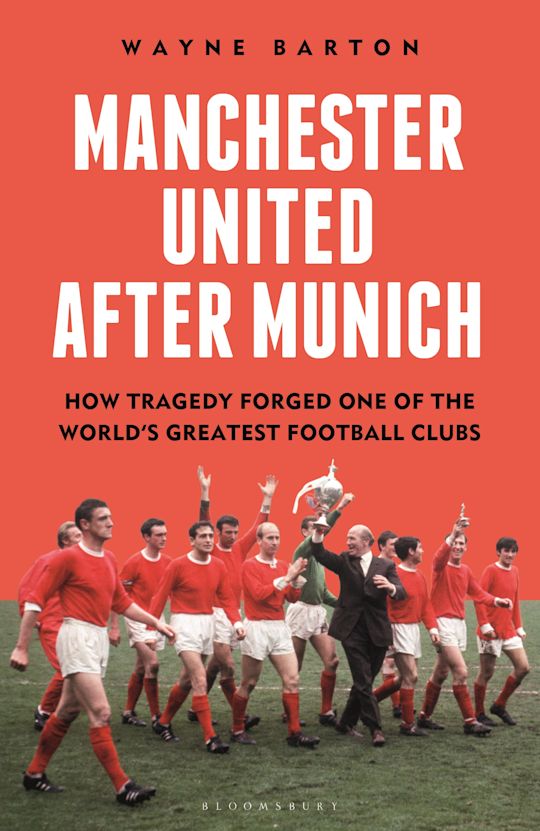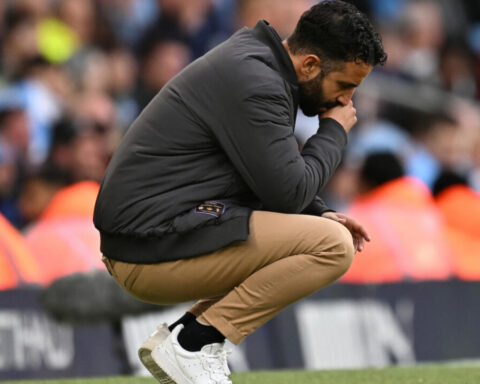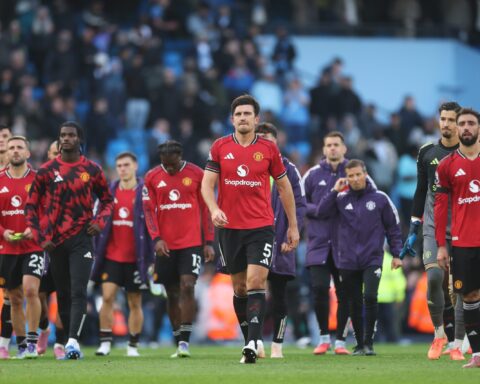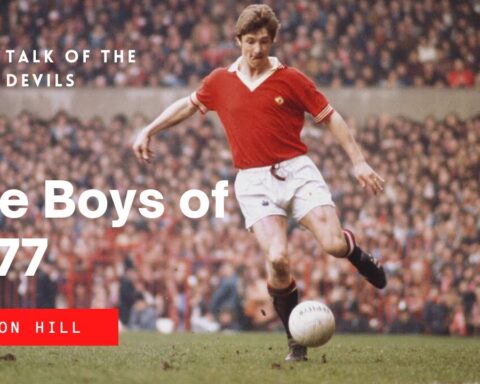You’ve heard the one haven’t you? On April 27th, 1974, Denis Law relegated Manchester United, his old club, from the First Division. Law, then at Manchester City, infamously scored a backheeled goal – his last act in domestic football – before walking off the pitch.
United were condemned to the drop. The symbolism, the tragi-romance, was all too real – Law, one of Old Trafford’s favourite sons, was heartbroken, and inconsolable… until he discovered that his old club would not have been saved, regardless of the result that day.
Manchester City’s fans have stuck to the myth. Why wouldn’t they? It’s football at its best. As Tommy Docherty told me – your old players come back to haunt you.
However, factually, Law did not relegate United. His goal, and the consequences of it, were immaterial, even though they remain the most memorable visual reminder of the day United went down.
So let’s tell the story.

United had endured a dismal season. Their post-European Cup demise had been painful to witness for all reds, and their descent down the table accelerated when Bobby Charlton retired, Denis Law was given a free transfer and George Best finally left after one more flirtation with the club. European Cup-winning stalwarts like Bill Foulkes, Paddy Crerand and Tony Dunne were long gone.
Law’s departure is the one which is the most relevant to this story. He had struggled with knee injuries for over six years, and in his final season with United, was barely able to train. He was taking injections to get him through the ninety minutes.
Docherty felt this was unfair on the other members of the squad who did train all week, but didn’t have the courage to tell Law to his face that he was no longer needed. The pair had gone back a long way. Law was one of the men Sir Matt Busby consulted when the decision to hire Docherty was being considered. In their final meeting of the 1972/73 season, Docherty told Law he would see out the following season at United – to go away for pre-season and return. However, when Law arrived in Aberdeen that very night, he went to the pub and the landlord had Sportsnight on the television – where Law learned that he had been free transferred by Docherty.
United had endured a dismal season. Their post-European Cup demise had been painful to witness for all reds, and their descent down the table accelerated when Bobby Charlton retired, Denis Law was given a free transfer and George Best finally left after one more flirtation with the club. European Cup-winning stalwarts like Bill Foulkes, Paddy Crerand and Tony Dunne were long gone.
Law’s departure is the one which is the most relevant to this story. He had struggled with knee injuries for over six years, and in his final season with United, was barely able to train. He was taking injections to get him through the ninety minutes.
Docherty felt this was unfair on the other members of the squad who did train all week, but didn’t have the courage to tell Law to his face that he was no longer needed.
The pair had gone back a long way. Law was one of the men Sir Matt Busby consulted when the decision to hire Docherty was being considered. In their final meeting of the 1972/73 season, Docherty told Law he would see out the following season at United – to go away for pre-season and return. However, when Law arrived in Aberdeen that very night, he went to the pub and the landlord had Sportsnight on the television – where Law learned that he had been free transferred by Docherty.
It was a confusing matter for United fans. Docherty insisted Law knew. Law insisted he didn’t. Supporters were gutted to see their hero go, even if they understood the time was coming. It the same when Best made his brief return, only to leave in acrimonious circumstances – a story of its own for this column in the future.
Heading into their final home game – their penultimate game of the season – United, after a dismal season, needed to win in order to have any chance of staying up. If they won, against Manchester City, they would then have to win at Stoke City, and still hope results went their way.

United’s biggest problem was that Birmingham City were three points in front of them and had only one game remaining – and that game happened to be against Norwich City at home. Norwich City, already relegated, certain to finish bottom.
If Birmingham won, they would be on 37 points. These were the days of two points for a win – so it would make it immaterial what United did, as the maximum they could get would be 36. Even if they won their final two games by scores of 20-0, they’d be going down.
And that, friends, is exactly what happened. Birmingham gave United hope when Norwich scored inside of five minutes. But in the five minutes before half-time, Brum scored twice to lead 2-1 at the interval and put themselves in a position of supreme control.
United’s players were made aware of the scores at the break, and had the wind knocked out of their sails. They went close in the second half when Sammy McIlroy had an effort cleared off the line, but Tommy Docherty’s youthful team started to get desperate, knowing things hadn’t changed elsewhere. City, with no pressure on them after finishing mid-table and with a squad packed of experience, began to use United’s urgency against them, and cut through with simple moves to create chances of their own.
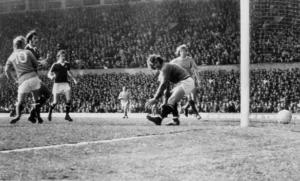
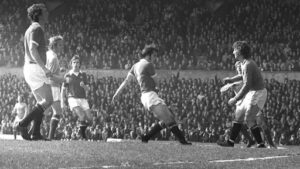
One such chance fell to Denis Law in the area in the 82nd minute. You could almost sense his reluctance; Law of old would be lightning quick in the moment, clinical to the extreme.
Here, his act was almost that of a player in an exhibition – flicking out a heel, barely expecting anything of it, and unable to celebrate even when his body reacted in the instinctive way it had for all his career, and was unable to resist the sniff of a goal.
Law walked straight to the side of the pitch and was substituted. It was his last moment in club football. He did not walk to the City bench as play resumed. He trudged off the pitch and – again, perhaps, instinct kicking in – went to the United dressing room, where his international team-mate Jim McCalliog later found him, with his head in his hands.
“I went over to see Denis and embraced him,” Jim recalled, “to see if he was okay. Obviously he wasn’t.”
He was relieved, though. The referee had not long blown to restart the game when pitch invaders took to the field. There were so many that the official sent the players to the dressing room. As the minutes went on and supporters refused to leave the field, the Birmingham result came in. Game over. United were down.
In the interest of safety and preventing further trouble, there was just no point sending the players back out on to the pitch. Nor was there any sense in replaying the game. The result stood. Manchester United 0-1 Manchester City. Law 82.
United could have staged one of their famous late comebacks – a theme even in these days, when a young Docherty side recovered from 2-0 down in the 87th minute to snatch a draw from Chelsea in November ’73. It wasn’t impossible, though unlikely. What was impossible was that United could have won and stayed up.
If United had turned it around in the remaining eight minutes, the maximum amount of points they could have got would have been 36, and you don’t need to be Einstein to know 36 is lower than 37. So Law’s goal was immaterial in how United went down – but it was nonetheless a layer of theatre, a Hamlet’s death for Docherty (well, not quite, we don’t need to reframe Tommy as the hero of the piece!).
This was a well-established truth but because of the symbolism, City fans have always taken great pleasure in the myth. It was something which upset Law, a man who had given so much to both Manchester clubs. Law’s relief came at knowing he didn’t send United down, and he gave one television interview in 1974 where he spoke about it to angrily deny it (“Let’s get it right, don’t give me that, United went down because Birmingham City beat Norwich, I never put them down”), and then famously refused to speak about it again.
In 2018 I was writing my book Too Good To Go Down, and making the film at the same time, interviewing many of the key protagonists of the story. That included a lot of time with Tommy, who I worked with many times before – and also an interview with Denis Law, who I had met before but never interviewed.
It was the last interview for the film and we were not expecting Denis to talk about ‘the incident’ – but I was completely surprised and honoured when he did. Repeating that he didn’t send United down, he said, “What could I do? It was a fluke anyway. I didn’t know where the ball was. I didn’t celebrate, anyway.”
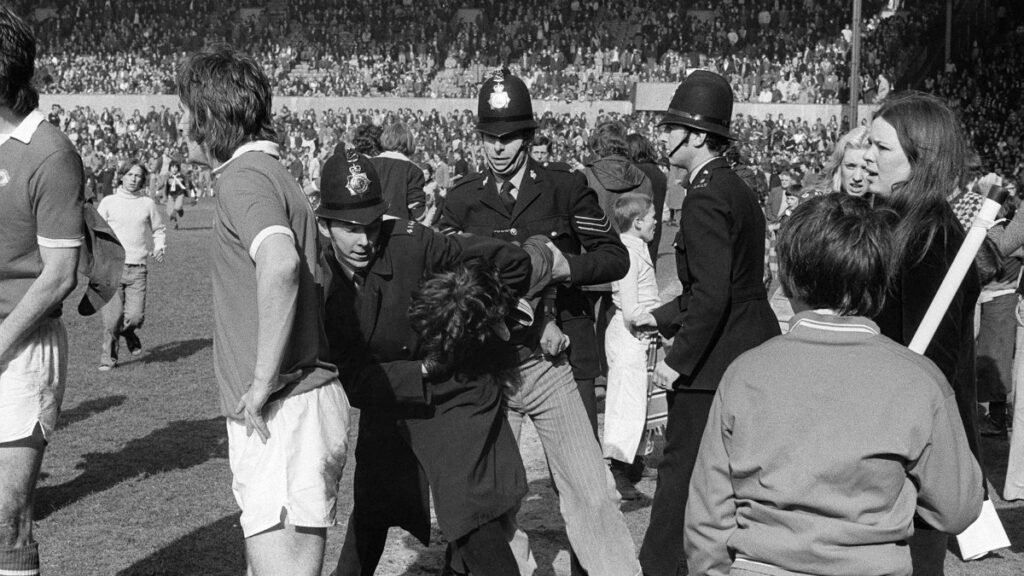
There you have it, as comprehensively as it could be stated – mathematically, Denis Law’s goal had no impact on Manchester United’s relegation other than the symbolism, and the man himself resented the insistence that it did.
Want to read more about that? Order my book Too Good To Go Down or watch the film when it’s on TNT Sport.


